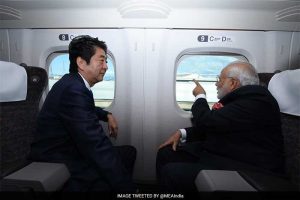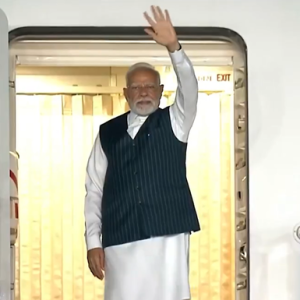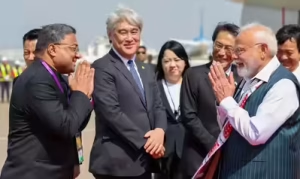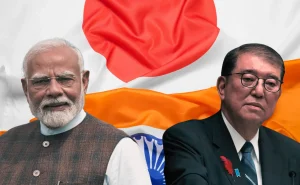New Delhi – Prime Minister Narendra Modi‘s strategic visit to Japan marks a significant milestone in strengthening India-Japan relations, with both nations set to deepen economic and strategic partnerships amid evolving global dynamics. This PM Modi Japan Visit comes at a crucial time when regional cooperation faces new challenges and opportunities.
Historic Investment Commitment Highlights PM Modi Japan Visit

The PM Modi Japan Visit has garnered international attention following Japan’s commitment to invest 10 trillion Yen ($68 billion) to boost bilateral business with India over the next decade. This substantial investment package demonstrates Japan’s confidence in India’s growing economy and represents one of the largest foreign investment commitments in recent years.
The investment will focus on multiple critical sectors including artificial intelligence, semiconductors, environmental technologies, and medicine. This comprehensive approach aligns with India’s vision of technological advancement and sustainable development, making this PM Modi Japan Visit particularly significant for both nations’ future growth trajectories.
15th India-Japan Annual Summit Takes Center Stage


During this PM Modi Japan Visit, the Prime Minister will participate in the 15th India-Japan Annual Summit alongside his Japanese counterpart, Shigeru Ishiba. The summit represents the culmination of years of diplomatic efforts to strengthen bilateral relations and establish new frameworks for cooperation.
Prior to the visit, Prime Minister Modi emphasized the importance of this engagement, stating his intention to “give new wings to our collaboration, expand scope and ambition of our economic and investment ties, and advance cooperation in new and emerging technologies, including AI and Semiconductors.” This statement underscores the transformative potential of this PM Modi Japan Visit.
Quad Partnership Remains Strategic Priority

A crucial aspect of this PM Modi Japan Visit involves discussions on the Quad partnership, described by foreign ministry officials as an “important platform” on the agenda. The Quad represents a strategic grouping designed to counter regional challenges and provide Indo-Pacific nations with alternative funding and economic development options.
Also Read: Shocking Minneapolis School Shooting Leaves 2 Dead & Probed as Terrorism Or Hate Crime
However, the Quad faces current challenges following recent tariff impositions that have strained relations among member nations. The PM Modi Japan Visit provides an opportunity to address these concerns and reinforce the partnership’s foundational principles while navigating complex geopolitical dynamics.
Bullet Train Project Advancement Expected
Infrastructure development forms another cornerstone of this PM Modi Japan Visit, with particular emphasis on Japan’s participation in India’s bullet train project. Prime Minister Modi will visit Tokyo’s Electron Factory and Tohoku Shinkansen plant in Sendai, where bullet train coaches are manufactured.
This facility visit, accompanied by Japanese Prime Minister Ishiba, is expected to advance discussions on Tokyo’s continued involvement in India’s high-speed rail infrastructure. The bullet train project represents a flagship initiative in India-Japan cooperation, showcasing Japan’s technological expertise and India’s commitment to modernizing its transportation infrastructure.
Defense Cooperation Strengthens During Visit


The PM Modi Japan Visit also prioritizes deepening defense cooperation between both nations. The Indian Navy and Japanese Maritime Self-Defense Force are exploring potential collaboration in ship maintenance operations within India, representing a significant step forward in bilateral defense ties.
This defense cooperation initiative demonstrates both countries’ commitment to regional security and their shared vision for maintaining stability in the Indo-Pacific region. Such partnerships become increasingly important as both nations navigate complex security challenges in their respective spheres of influence.
Technology and Innovation Partnership Expansion
Semiconductor cooperation represents a crucial component of this PM Modi Japan Visit, reflecting global trends toward technological self-reliance and supply chain diversification. The focus on emerging technologies, including artificial intelligence and semiconductors, positions both nations to benefit from the ongoing digital transformation.
Japan’s expertise in precision manufacturing and India’s growing technology sector create natural synergies that this PM Modi Japan Visit seeks to capitalize upon. These partnerships could potentially reshape regional technology landscapes and reduce dependencies on other global suppliers.
Regional Dynamics and Future Engagements
Following his Japanese engagements, Prime Minister Modi will travel to China to attend the Shanghai Cooperation Organisation Summit in Tianjin, accepting Chinese President Xi Jinping’s invitation. This sequence of diplomatic engagements demonstrates India’s commitment to maintaining balanced relationships across the region.
The PM Modi Japan Visit therefore serves as a foundation for broader regional diplomacy, establishing strong bilateral ties that can withstand evolving geopolitical pressures. These engagements reflect India’s strategic approach to international relations, prioritizing economic cooperation while maintaining diplomatic flexibility.
Conclusion: A Transformative Diplomatic Initiative
This PM Modi Japan Visit represents more than a routine diplomatic exchange; it embodies both nations’ commitment to building resilient, forward-looking partnerships. With substantial investment commitments, technological cooperation frameworks, and defense collaboration initiatives, this visit establishes foundations for decades of enhanced bilateral relations.
The success of this diplomatic initiative will likely influence broader regional dynamics and demonstrate the potential for constructive international partnerships in an increasingly complex global environment.

